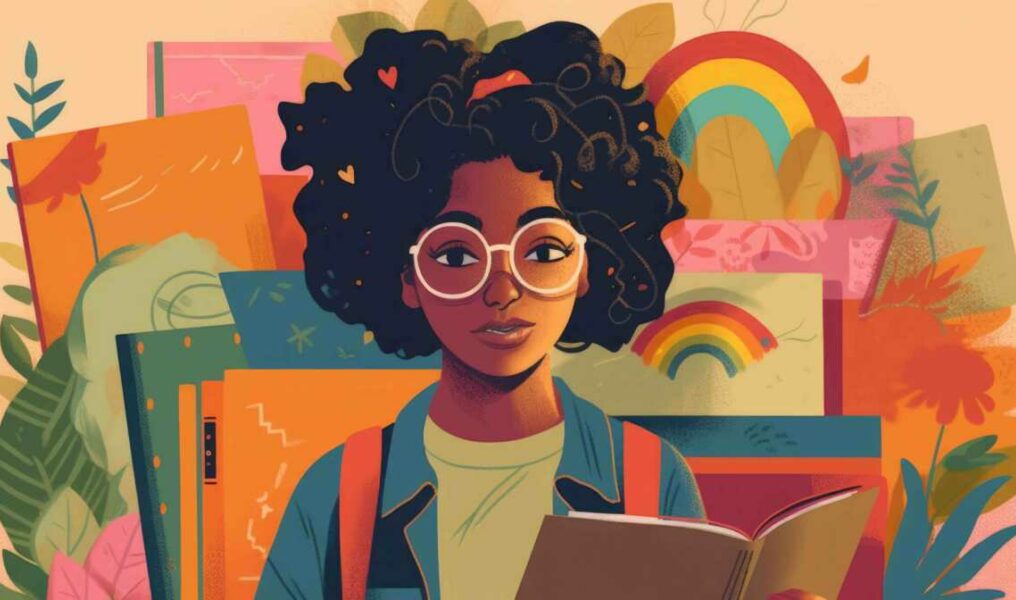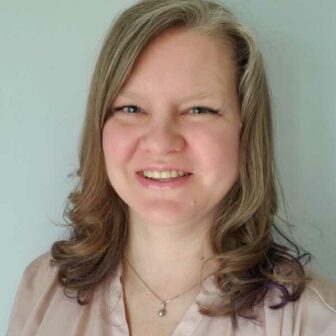How GLSEN’s Rainbow Library Combats Censorship, Supports LGBTQ+ Students in Michigan and Beyond
Project helps local libraries serve as safe spaces for queer youth

In more affluent communities, school libraries are often taken for granted.
Until eight years ago, the Muskegon County Career Tech Center, where Lindsay Pulsipher serves as librarian, had no collection of books for students to read. So she joined forces with teachers to stock the library with donations and later lobbied for a budget.
“The idea is that Muskegon County has a very low reading level compared to the rest of the state,” Pulsipher said. “And so we’re trying to get kids interested in reading. I’ve relied on things like First Book and the Rainbow Library program to bring in books so that it is affordable and stays diverse enough for our population.”
Rainbow Library grants, a program offered by the LGBTQ+ nonprofit GLSEN, provide free sets of grade-appropriate, LGBTQ-affirming books to schools in select states. Now in its third year, what began as the project of one GLSEN chapter has become so popular that in Michigan alone, 272 schools — more than a third in rural areas — have received books. There is also a waitlist. The program relies on national sponsors like General Motors as well as private monetary donations.
Outside of the west Michigan city of Muskegon, whose residents elected an openly gay mayor and where one can attend an annual Pride festival, the county is relatively conservative, Pulsipher says. None of the books in the Career Tech Center’s collection have been challenged, perhaps because the students are older and the books go unnoticed. By contrast, in one middle school in the county, a Moms for Liberty group targeted a teacher for “exposing minors to pornography.”

Pulsipher said the administration of the career tech center, which draws 800 students from 16 school districts, supports the Rainbow Library initiative, even if some teachers would rather keep LGBTQ+ issues out of the classroom: They focus on careers. Period.
“You do your work and then you go home,” Pulsipher said. “So the library is kind of a safe space for students. And as students have come in and seen themselves represented, whether it is the Rainbow Library of books or books that represent persons of color or whatever it is, they go, ‘Oh my goodness, that’s me.’”
Michael Rady, director of the Rainbow Library program, is a former third-grade teacher.
“Michigan was one of the states that submitted more Rainbow Library requests to us than nearly every other state,” Rady said. “We hear time and time again, from educators, from school librarians, just how valuable these books become and how much in demand they are once they are received. We’ve heard stories of a school getting our books on a Friday, and then on Monday all the books are checked out.”

In one middle school in a small town in the Upper Peninsula, that was the case with the graphic novel series “Heartstopper,” which the library added to its collection outside the GLSEN Rainbow Library program. Language arts teacher Kevin said he can’t keep it on the shelves. Kevin asked that his last name and the name of his school not be disclosed due to anti-LGBTQ+ sentiment in the community.
“The ‘Heartstopper’ series was so heavily read within the first year of having it that I’ve had to replace the books,” Kevin said. “The books were falling apart.” And sometimes the books go missing — but Kevin said he’s not here to judge. “To me, it’s not a thing of ‘You stole a book.’ It’s more about they found something within [the book] that was special to them, and for better or for worse, it’s theirs now.”
Kevin was faced with overhauling the outdated library where he teaches. In his case, the existing books were at least 30 years old.
“I wanted to make sure students had access to books that are just from people with different perspectives, different life events, different feelings,” Kevin said. “Also, just the students who fall into the LGBTQ+ umbrella, they just know that there are books for them. There are books with people who have had similar stories to theirs.”
An ally to his queer students, Kevin found certain LGBTQ+ young adult literature broadened his horizons too. He pointed to “Parrot Fish,” read in a book club with older students. “It opened my mind,” Kevin said. “I had no idea that there were young adult or YA books that just told these stories in these meaningful [ways]. I just remember that moment.” “Parrot Fish” is not a part of the Rainbow Library collection at this time.
Downstate, bordering Detroit, the Rainbow Library came to Eastpointe Community Schools under the direction of openly gay library director Patrick Taylor. As soon as Taylor informed the administration of the books’ arrival, they called for a social media blast to celebrate their district’s new set of queer literature.
Like the majority of schools that have received a Rainbow Library in Michigan, Eastpointe is a Title 1 school where students are eligible for free lunch.
“In those [book] titles, there was a lot of intersectionality,” Taylor noted. “So not only was it highlighting the queer community, but it was also highlighting the BIPOC queer community. And I thought that was just kind of a really cool thing.”
In fact, Rady said the sets of books don’t differ based on demographics. Sixty percent of the books are written by queer BIPOC authors and 40 percent are trans or nonbinary. There’s a reason for that. “These are the books that have had the least presence in public schools and public education and public libraries,” Rady said. “And they’re the most pressing to be getting in front of kids.”
One book with this kind of queer representation is “Genderqueer,” a book that isn’t part of the Rainbow Library collection, but which has been especially popular in Eastpointe. That book had one trans student returning to the library after a two-year absence. Not only that, one of the teachers now uses the text as part of her high school curriculum.
Taylor was invited to speak before the board of education on the state of the libraries. Among other things, he highlighted the Rainbow Library.
“Two of the school board members applauded me in not shying away from what could be controversial and keeping current with what our kids want,” Taylor said. “So, again, it was all around just a supportive response from the community, from the students, from the staff, from administration and from our board of education.”
Nationally, the Rainbow Library program has reached more than 2.5 million students. At the same time, a teacher in Georgia was fired earlier this month for reading a book to her elementary school students that age-appropriately discussed gender identity. Rady said that the firing only serves to punish teachers for teaching about the world as it is and tells them that they and their students don’t belong.
“I would say that GLSEN stands with that teacher and all teachers that are doing everything they can to affirm their students in their classrooms,” Rady said.









